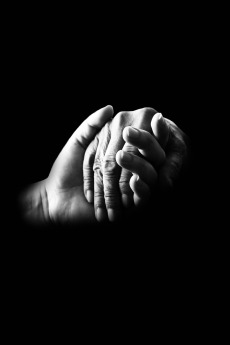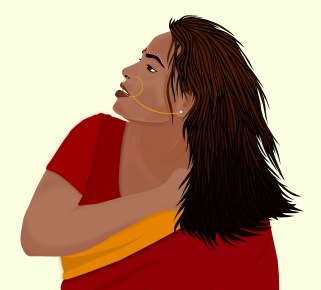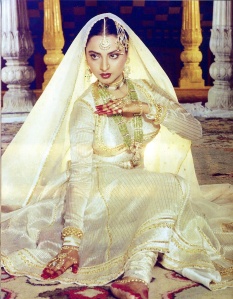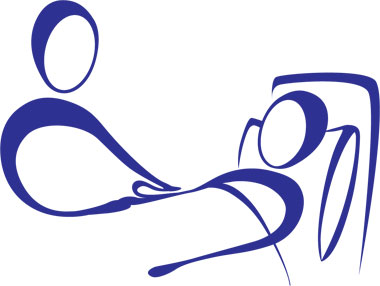When I was 22, I knew I’d be married by 26. When I turned 27, I thought, maybe it’s a good thing that I hadn’t found myself someone yet. I eagerly awaited my 30s. It would be different, I hoped. And then I hit 32, and released my debut novel. No marriage. No husband. No in-laws. No children. A book, instead. Not exactly as I had planned, but still very exciting.
I was happy. Except that, I could hear faint “voices of concern” around me. All differently put, but in essence saying the same thing: “Now, only if you could find yourself a nice man, wouldn’t that be perfect?”
I am writing on my blog after over two years. A lot has happened in these intervening years—work and life included—and that’s kept me busy for most part. Here I am again, writing about something that’s personal, very personal. And yet, I feel it needs to be shared, because this experience is common to so many of us.
It’s barely been 24 hours since I completed watching all the episodes of the Netflix documentary series, Indian Matchmaking, and there are so many different emotions I am experiencing right now. It needs an outlet.
For a better part of last week, I refrained from watching the show. Everyone was calling it out for being regressive. Matchmaker Sima aunty and her caustic observations about people and their choices of life partners, and her views about marriage—compromise and adjustment—seemed to have ruffled many feathers. I didn’t want to add to the noise. Some part of me had already decided that I’d hate the show. Why? Because, it felt like a page out of my own book.
I belong to a Konkani Catholic family in Mumbai with mixed ancestry—Karwari, Mangalorean and Goan. My parents fell in love, and got married when they were in their 20s. All their siblings took a very similar route. And so, while marriage proposals came and went, thanks to extended relatives who brought them by a dozen, it was never really taken seriously in their households. I grew up in a family where love thrived and prevailed (touchwood), and my parent’s story of finding each other, was charming enough to seep into my consciousness. I told myself, if I were to find love, it should be as good as this—nothing less or more. And I was okay with waiting, even if forever.

- Courtesy: Indian Matchmaking, Netflix
Career and education have mostly been at the heart of everything I did, but I was reminded—like it happens in most typical Indian families—that it’s good to “settle down” at the right time. The right time never came. Because the right man never came. And were I to tell someone that I had not been in a relationship, I’d usually get two kind of reactions—aww or awe. The former was mostly because they felt sorry for me, and the latter because, “wow you sound alien”. How does it feel like to be an alien, Jane? Normal, I guess. Very, very normal.
But it was discomfiting, of course. For my parents, mostly. They got called out, very often. For having an unmarried daughter, whose clock is ticking. Tick tock. Tick tock. Every wedding we attended, they got asked, “When are you giving us the good news?” My parents finally succumbed, without really knowing the challenges of navigating the world of arranged marriages. And to have a daughter who was against it, didn’t help. I am practically against everything. Matrimonial ads and dating apps, included. I am very filmi that way. Blame Norah Ephron and just that one film of Karan Johar’s (KKHH), for ruining me. I think love happens, when it has to and if it has to. Serendipity, more like. You meet someone. You know they are the one. And boom. Violins, piano, butterflies, and whatnot. Now, how do you deal with a woman like that. There will be tantrums, of course. And I threw many of them. My mum’s sisters, and cousins, and I don’t know who else, sent rishtas (proposals) to my mum, and I said, “no” without looking at them. Wait, I did look at their photograph actually. Rolled my eyes. And said, “No”. One of them snapped at my mum, one day. “Who does your daughter think she is? Princess Diana?” My mum asked me the same question, out of exhaustion, really. And I was tempted to say, “yes”.
I was stubborn. The same kind of STUBBORN that Sima aunty speaks about in the show. The rigid and aggressive kind of woman, who needs to be flexible if she wants to find a man. But I didn’t want to find a man, not just as yet. Then one day, with all that pressure building up from everywhere, I relented. But on one condition. No putting up marriage profiles online. Someone suggested that a matchmaker would be an answer to that problem. That’s how I ended up speaking to one, on a rainy afternoon in 2016. She sounded sweet—this lady. Worldly-wise, I thought, when it came to marriages. She asked me a pointed question: “What kind of man would I like?” “What kind?” I didn’t know. That conversation didn’t go down well. She asked me to think about it, and call her back. I did as I was told. I thought about it. Very hard. But I couldn’t really point out what I wanted in my man. So, I didn’t call her back. When my mum found out, she chided me for being rude. I eventually did call her back, and was as honest as I could be: “I’ll know when I see one.”
“You sound like an ambitious girl,” I remember her saying. “Why don’t you meet me, so that I know exactly the kind of boy, I could introduce you to?” I wasn’t going to take that train to Andheri to meet her. Too lazy, I’d say. I didn’t go. But that’s how my tryst with matchmakers began.
Since then, I have been introduced to three more of them. This doesn’t count all my aunties, who’ve played matchmakers. I have seen the photographs of over 15 boys, ended up going to see only two. And for a good part, I have had reasons to not see them—all of which, sounded like “excuses” to everyone else. I had to stop being picky, I was told. Sometimes, I have been asked to separate my profession (journalism) from my personal, which is to stop looking at prospects like subjects (in an interview) that need to be discerned and interpreted, for a newspaper article.
In fact, I remember the first time, I went to meet someone, I hardly played journalist. I was so warm that I teared up in front of this stranger, while telling him, “How an arranged marriage is not something I saw myself doing?” The second time, me and my “date,” spoke about his love for superheroes, though I probably had no interest in it. The third time, the prospective groom’s family decided they had liked me after seeing a couple of photographs (which can be misleading, you know), and then announced that they’d like to come and meet all of us. When I insisted I meet the man before the families saw each other, his mother, said that her son didn’t feel the need for that, as there was nothing to say beyond whatever he had already shared in his bio-data. Thank God for my mum, who refused point blank, but not before getting an earful from this woman, who told her “your daughter is getting old. Don’t forget! Her options are running out”. The fourth time, I agreed to meet this person after a phone conversation that lasted barely 30 minutes where I spoke for two minutes, only to message him, the very next day, saying, “I would be wasting his time.” I don’t take rejections well, and I didn’t want to put someone else through it. It would have been unfair, considering I knew exactly what I wanted. Now, that proposal was really the deal-breaker, because everyone thought I had landed myself a “catch,” including the man himself. My matchmaker told my mum that I was beyond help. After all, she had found the best and most suitable life partner for me. Everyone felt it would have clicked, had I not been “stubborn” and “unrelenting” about not wanting to move countries. These are words that keep popping up in the reality show, too. My friend, who has had a shared experience, put it simply: “It’s not a bad thing.” Stubborn is good.
It’s what got me binge-watching Indian Matchmaking. Episode after episode, I saw people like me, negotiate this space of arranged marriages, sometimes with grace, sometimes feeling crushed and hopeless, and even more miserable. It’s hard to explain what you want, when you know exactly what you want. Some of us are looking for good and positive vibes; some of us just for that face that looks and feels familiar and smells like home; some, for an affectionate, caring and warm soul, and some for that little mantle that you could call your “most prized”. And in between all of this, is the Indian matchmaker, who is told to make sense of our choices.
Many have claimed that the show is regressive, and that for our age and times where India is trying to break out of the shackles of orthodoxy, it’s horrid that Netflix would choose a topic like this one. And yet one can’t deny that it’s also a mirror to our society. But I didn’t write this post to comment on the rights and wrongs of this show or using a matchmaker to find myself the kind of partner that I didn’t want in the first place.
I think, what this show did to me, was make me feel less alone. That there will be many, many Sima and Geeta aunties telling me that I am wrong. And that it’s never good to be forthright, independent and ambitious. That asking too many questions is being presumptuous. That an intervention of a life coach or an astrologer might solve a lot of your problems. But the truth is you know what you want, better than anyone else.
It was comforting to find a few, who by the end of all this, realised that they were the centre of their own universe (like Ankita) or even Aparna, whose “rudeness and wish-list that’s as long as a menu card” didn’t go down with Sima aunty, but was something I quite enjoyed. There are also marriage arrangements you know are paper-thin from the very outset. And one can only hope, they outlive their prime, like some of the wonderful stories that are interspersed within the show.
I cannot deny that I often played to the gallery. Said “okay” to things I wasn’t okay with. Told friends, who were experiencing the same tumult as me, to “give the man/girl a chance, at least.” It helped keep status quo. It made me feel like I was doing my part, and doing it well. I am guilty, yes. But I am not apologetic. I never challenged arranged marriages in the first place. I just questioned it. Though, going through the grind, just made me more confused about my choices, it made me feel that the track I was on, was not good enough; it made me feel lost, and that’s never great for your self-esteem.
I, however, do believe in going with the flow. Because every journey can be as interesting, as it is exhausting. Like the swipe lefts and swipe rights, it could go either way, and sometimes the very things you don’t like about someone, are the things that stick. I remember some years ago, my brother showed me a Facebook profile picture of someone he thought would make a good life partner. This person had taken a photo of himself through a glass window. Except for the contours of his face, and his ear lobes, I couldn’t see much. “How does he look?” he asked. “What can a reflection on a glass say?” I replied, as a counter question. Nothing. I had decided that a man who couldn’t take a decent profile picture, wasn’t the man I wanted to be with (shallow, right?). When I accidentally ran into this person some months later, he was definitely, anything but nothing. First impressions can be impossibly hard to make. It’s harder when someone dangles a carrot like “marriage” in front of you.
But the truth is that prospects will come and go. And so, will Sima aunty, by default of us being Indian. One has to decide, who controls this matchmaking narrative. She, them, or you.
































































 IN ABOUT two weeks, I’ll be turning 30 and, I’d be lying if I said that I am not looking forward to it. I am not among those, who shy away from getting older. I like to celebrate that day, sometimes ridiculously and embarrassingly in grand fashion. In that department, I’m still a five-year-old. Those close to me would know, how my birthday has me excited at least two months ahead of time. Of course, now, with age and work, that countdown process seems rather tedious. Between ‘work-eating-gym-again more work-eating-sleep’ time, my brain finds little space for ‘50 days to go’ reminders. These days, my girlfriends do that job for me, and I’m like, “Aah, yes! Is it?”
IN ABOUT two weeks, I’ll be turning 30 and, I’d be lying if I said that I am not looking forward to it. I am not among those, who shy away from getting older. I like to celebrate that day, sometimes ridiculously and embarrassingly in grand fashion. In that department, I’m still a five-year-old. Those close to me would know, how my birthday has me excited at least two months ahead of time. Of course, now, with age and work, that countdown process seems rather tedious. Between ‘work-eating-gym-again more work-eating-sleep’ time, my brain finds little space for ‘50 days to go’ reminders. These days, my girlfriends do that job for me, and I’m like, “Aah, yes! Is it?”




